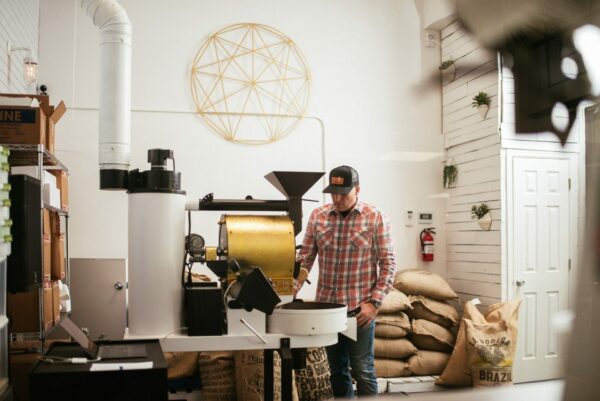
What is Third Wave Coffee Roasting? An Art and Science of Flavour

The third wave of coffee is a movement that has revolutionised the way people view, produce, and consume coffee. At its core, it is about treating coffee as an artisanal product rather than a commodity. This shift has brought significant changes to every step of the coffee process, but one of the most notable transformations has been in coffee roasting.
Third wave coffee roasting is both an art and a science, focused on bringing out the natural flavours of the coffee bean while showcasing its unique origin and character.
It’s Quality Over Quantity
Third wave coffee roasting begins with an uncompromising focus on quality. The beans used are typically from single-origin sources, often grown in small farms or cooperatives in ideal climatic conditions then roasted by Speciality UK roasteries.
These speciality beans are meticulously harvested and processed, ensuring they meet rigorous standards. Unlike mass-produced coffee, third wave roasters prioritise quality over quantity, working with beans that have been graded and scored highly on the coffee industry’s 100-point scale. The emphasis is not just on the bean itself, but on its entire journey from farm to cup.
Transparency and Traceability of the beans
One of the hallmarks of third wave coffee is its dedication to transparency. Consumers are encouraged to learn where their coffee comes from, who grew it, and how it was processed. This information is often proudly displayed on packaging or shared by baristas in coffee shops.
Such traceability fosters a stronger connection between the consumer and the farmer, highlighting the craftsmanship involved in producing coffee.
For roasters, this means working closely with farmers and sometimes engaging in direct trade to ensure fair pricing and sustainable practices.
The Philosophy of Roasting
The roasting process in third wave coffee is a delicate balance between art and science. Unlike traditional dark roasting, which prioritises a uniform, smoky flavour, third wave roasters often favour lighter roasts. This approach allows the natural flavours of the coffee bean—such as fruity, floral, or nutty notes—to shine through.
Roasters seek to develop the bean’s intrinsic qualities rather than masking them with the heavy, caramelised tones often associated with darker roasts.
Small-batch roasting is another cornerstone of the third wave. By working in smaller quantities, roasters have greater control over the process, ensuring consistency and precision in each batch.
This artisanal approach requires not only technical skill but also an acute sensory awareness, as roasters must carefully monitor factors such as temperature, time, and airflow to achieve the desired flavour profile.
The Science of Precision when roasting coffee beans
Advancements in roasting technology have played a pivotal role in the third wave movement. Modern roasting equipment allows for meticulous control over every stage of the process. Roasters can experiment with variables like temperature curves and development times to bring out specific characteristics in the bean. This scientific precision enables roasters to unlock a bean’s full potential, highlighting the unique terroir of its origin.
Terroir—a term borrowed from the wine industry—refers to the environmental factors that influence the flavour of a crop. Just as grapes from different regions produce distinct wines, coffee beans reflect the soil, climate, and altitude in which they are grown.
Third wave roasting celebrates this diversity, treating coffee as a product of its environment and encouraging consumers to explore its wide-ranging flavour profiles.
Sustainability and Ethics of Sourcing Coffee Beans
The third wave of coffee is deeply rooted in sustainability and ethical responsibility. Many roasters prioritise direct trade relationships, which not only ensure fair wages for farmers but also foster long-term partnerships that benefit both parties.
Additionally, environmental considerations are paramount, with many roasters adopting eco-friendly practices such as reducing energy consumption during roasting or using biodegradable packaging.
By placing sustainability at the forefront, third wave roasters aim to create a more equitable and environmentally conscious coffee industry. This commitment resonates with consumers who value both quality and ethical sourcing.
A Cultural Shift
Beyond the technicalities of roasting, third wave coffee represents a cultural shift in how people perceive and enjoy coffee. It invites consumers to approach coffee as an experience rather than a routine. The careful attention to detail in every cup reflects the artistry and dedication of the roaster, creating a deeper appreciation for the craft. The movement also fosters a sense of community, as coffee shops and roasteries become gathering places for those who share a passion for high-quality coffee.
Conclusion
Third wave coffee roasting is a testament to the transformative power of passion and precision. By focusing on quality, transparency, and sustainability, it has elevated coffee from a simple beverage to an artisanal product worthy of exploration and celebration. Whether you are savouring the bright acidity of an Ethiopian Yirgacheffe or the nutty sweetness of a Guatemalan Huehuetenango, each cup tells a story of origin, craftsmanship, and care. In embracing third wave roasting, we discover not just exceptional coffee, but a richer connection to the people and places behind it.













































